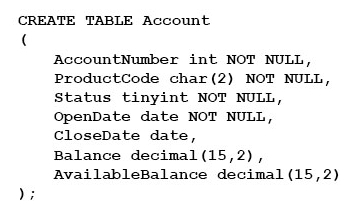

Note: This question is part of a series of questions that present the same scenario. Each question in the series contains a unique solution. Determine whether the solution meets the stated goals.
The Account table was created using the following Transact-SQL statement:
There are more than 1 billion records in the Account table. The Account Number column uniquely identifies each account. The ProductCode column has 100 different values. The values are evenly distributed in the table. Table statistics are refreshed and up to date.
You frequently run the following Transact-SQL SELECT statements:
You must avoid table scans when you run the queries.
You need to create one or more indexes for the table.
Solution: You run the following Transact-SQL statement:
CREATE CLUSTERED INDEX PK_Account ON Account(ProductCode);
Does the solution meet the goal?
neko
Highly Voted 5 years, 6 months agokiri2020
4 years, 7 months agomrn0107
Highly Voted 5 years agokiri2020
4 years, 7 months agoMML
4 years, 11 months agoHoglet
Most Recent 4 years, 6 months agoAndy7622
4 years, 5 months agogiuPigna
4 years, 7 months agoTheDUdeu
4 years, 6 months agoGocsan
4 years, 9 months agodatabasejamdown
4 years, 8 months agoCococo
4 years, 9 months agokiri2020
4 years, 7 months agoBraindripper
4 years, 5 months agoeggzamtaker
4 years, 5 months agodelgadillo
4 years, 11 months ago9078990
5 years ago